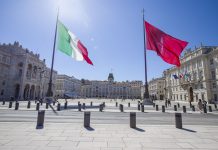by InTrieste
Friuli Venezia Giulia officials on Tuesday presented a progress report on a regional law aimed at strengthening family policy, highlighting substantial increases in funding and participation across key social programs.
Speaking during a session of the regional legislature’s oversight committee, Alessia Rosolen, the regional councilor responsible for labor, education, research, universities and family policy, said spending tied to Regional Law 22 has risen from €19 million in 2018 to €99 million projected for 2025. The funds, she noted, support initiatives designed both to bolster household purchasing power and broaden services available to families in the region.
Rosolen said the approach has shifted from one focused primarily on assistance to a system that sees families as active contributors to social and economic development. Since the law took effect, the region has introduced coordinated planning tools for family policy and 0–6 education services, established a dedicated working group, and expanded collaboration with nonprofit organizations.
Digitalization and eligibility expansion have driven growth in the Carta Famiglia program, which now reaches families with an ISEE income threshold of €35,000. Participation rose to 44,586 households in 2024, compared with 24,047 in 2021. Applications for the Dote Famiglia support measure also increased, from 27,743 in 2022 to 35,535 in 2024. Complementary pension support grew from 228 approved applications in 2023 to 733 in 2024.
Childcare coverage reached 43 percent in 2024 and 45 percent in 2025, according to the regional government, with plans to add roughly 1,200 additional slots. Summer camps and after-school programs received €1 million in both 2023 and 2024. Last year also marked the launch of a financial assistance program aimed at supporting youth independence, with 65 approved applications totaling €1.3 million.
The region also reported expanded gender-equality services through a reorganization of its Si.Con.Te. centers, which now operate eight full-time locations and seven limited-hours branches. Accesses to these services rose from 1,569 in 2022 to 2,643 in 2024.
Rosolen described the law, first adopted in 2021, as a pioneering model that anticipated national reforms and now serves as a basis for more integrated and systematic policy development focused on families.
































